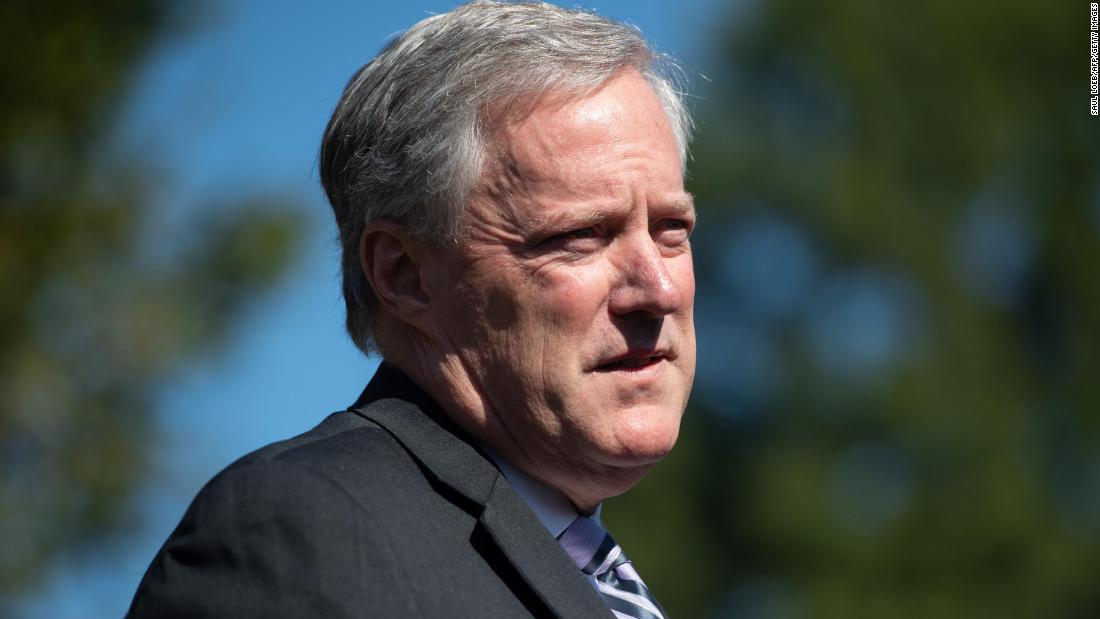
 news
news 
[ad_1]
The 38-page document, which is among thousands of pages of materials Meadows provided to the House committee investigating the January 6 insurrection at the US Capitol, was initially circulated by a retired Army colonel who was working to challenge the results, according to the Times. CNN has not independently verified the contents of the PowerPoint.
Phil Waldron, a retired colonel who spread misinformation about election fraud in the presidential election, told the Times that he circulated the PowerPoint among allies of former President Donald Trump, including lawmakers on Capitol Hill. Waldron told the Times that he did not directly send the document to Meadows, but that it was possible someone on his team had passed it along to the former chief of staff.
The committee has not publicly released that document and has not offered any specifics as to what the document contained.
Terwilliger told the New York Times that Meadows provided the document to the committee because he received it in an email and did nothing with it.
“We produced the document because it wasn’t privileged,” Terwilliger told the Times.
CNN has reached out to Terwilliger for comment.
Waldron told the Times that Meadows “would have gotten a copy for situational awareness for what was being briefed on the Hill at the time.”
Waldron told the newspaper that members of his team spoke with a group of senators on January 4 and that he personally briefed a small group of House members the following day about the contents of the PowerPoint. He added that the PowerPoint was made available to the lawmakers. CNN has reached out to Waldron for comment.
The fact that Meadows received and was in possession of the PowerPoint with this title is noteworthy, regardless of the document’s contents and what he did with it. Meadows played a central role in the peddling of election lies and attempted to use the power of the executive branch to intervene and interrupt the peaceful transfer of power, CNN has previously reported.
A separate, 36-page PowerPoint has been circulating on Twitter, but CNN has not confirmed the veracity of this document, and the committee tells CNN it is different than the document members have in their possession.
In addition to the PowerPoint, Meadows turned over a significant number of text messages, including one November 6, 2020, text exchange with a member of Congress, where Meadows reportedly said “I love it” in a discussion about the possibility of appointing alternate electors in certain states, and the member acknowledged the plan would be “highly controversial.”
The committee also has in its possession a text exchange between Meadows and an organizer of the January 6 rally from early January 2021, and text messages about the need for Trump to issue some kind of a public statement to stop the January 6 attack at the Capitol.
CNN also previously reported that in the tranche of documents Meadows provided to the committee, he was interacting “with a wide range of individuals while the attack was underway,” according to a source with knowledge of the communications.
The messages on Meadows’ personal cell phone and email account, which were voluntarily handed over without any claim of executive privilege, relate to “what Donald Trump was doing and not doing during the riot,” the source added.
These communications offer a window into what people were texting to Meadows on January 6, what he was telling them about Trump in real time, and what the former President was doing for those hours while the Capitol was under attack and rioters were chanting “Hang Mike Pence,” according to the source.
According to multiple sources, including former Trump officials and others with direct knowledge of what was happening behind the scenes at the White House, Meadows also reached out to some of the country’s top national security officials in an effort to connect them to Trump allies who were pushing unfounded claims of foreign election interference and voter fraud.
Not only did Meadows try to get top government officials to investigate baseless conspiracy theories being espoused by the likes of Rudy Giuliani, Mike Flynn and Sidney Powell, he also passed along conspiratorial materials himself, including YouTube videos and other information that alleged widespread evidence of voter fraud, sources say.
Despite the sheer volume of documents Meadows has turned over to the committee, he recently made a complete reversal and decided to stop cooperating and not show up for a scheduled deposition. The committee therefore has begun criminal contempt proceedings against Meadows, which the House is slated to vote on Tuesday. If the criminal contempt report passes the House, it will be referred to the Department of Justice, which will have to decide whether or not to prosecute.
[ad_2]
Source